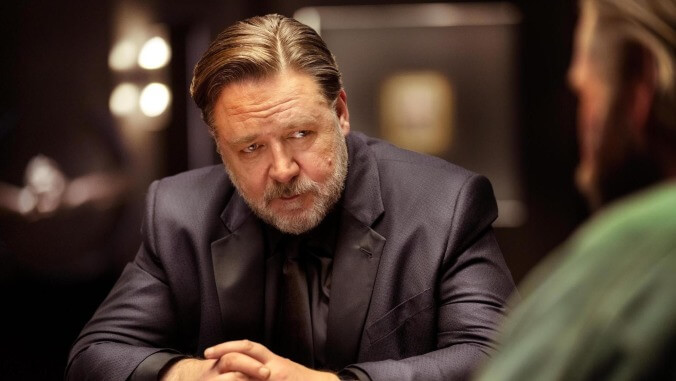Russell Crowe plays the wrong hand in Poker Face
Director-star Russell Crowe is more interested in misdirection than machismo

Movie stars may no longer automatically draw the big bucks they used to, but Russell Crowe is one whose name still feels like a guarantor of some degree of quality. Merely two years ago, for instance, Unhinged sold itself entirely on the premise of “Russell Crowe is going to kill you.” With Poker Face, his second dramatic feature film as director, Crowe is … the world’s greatest poker player! Can his best friends survive his greatest challenge yet? And what happens when … bad guys surround them and hold everyone hostage?
In the hands of any other director you might know what to expect: badass Crowe uses his amazing gambling skills to solve the problem of Die Hard at a poker game in a panic room. Crowe’s direction, however, might make you worry about his personal health, because he’s much more interested in the fact that his character, Jake Foley, is dying … and the internal-monologue ruminations on mortality that follow. The poker face of the title is less about the game, and more about the man pretending not to be ill.
Before the movie ever gets to a game of cards, Jake goes to a shamanic retreat and visualizes the ocean. He sits in an art gallery and gets lost in the paintings. He looks lovingly at his wife and daughter. He has internal monologues. And in a lengthy flashback presented in washed-out ’70s vision, he and his pals outwit a bully via a card game. Through a voiceover, he reveals that in 1994 he set up the world’s first online poker program, and his buddy Drew (RZA) adapted it into a government surveillance program, because poker is all about learning as much as you can about opponents and predicting their behavior. This has made him filthy rich, to the point that he can just give away cars for his friends to drive out to his remote, modular house that looks like a Lego build.
Jake has a few scores to settle with his old pals—one in particular that’s pretty personal. Of those pals, one’s a corrupt, compromised politician, one’s a suicidal drunk, and a third is secretly banging Jake’s wife. Paul (Steve Bastoni), the politician, has an even worse problem—thinking the card game would be at Jake’s penthouse suite overlooking the Sydney Opera House, he gives his brother the go-ahead to rob the art collection at Jake’s country house … where they are now all going to be.
Perhaps surprisingly, copious ass-kicking does not ensue.
Early in the poker game, when one person bets particularly high, others express frustration that the game may end after just a couple of hands if the money goes that fast. The script mirrors that possibility. Rather than featuring multiple situations in which Jake uses his talent for bluffing and playing the hand he’s got, there’s essentially just one, but you’re going to learn every last moment that built up to it. This isn’t a Paul Schrader or James Toback movie about gamblers; left to his own devices, apparently, Crowe prefers to show the sensitive side for which he’s rarely cast.
Even though the stated goal of poker is to know everything about one’s opponent—per Jake, anyway—the most aggressive of the main bad guys remains opaque. He’s crazy-mad at Jake for reasons that never become clear; Jake observes his behavior, but never really gives us the backstory.
Theatrically, it might not matter if viewers looking for righteous macho beatdowns have to sit through numerous meditations on life first. Crowe seemingly intends for the viewer to appreciate the tonal misdirection, but that requires having the patience to sit through it first.
So is it worth all that? Early in the game, Jake pretends he’s poisoned his friends, telling them shortly thereafter that he just wanted them to experience what he felt being terminally ill, if only for a moment. The movie tries to do the same, and it feels like a similarly unwarranted trick. If we wanted to see a movie purely about dying, Gaspar Noe’s recent Vortex is right there.
But when the poster shows Russell Crowe and playing cards, damn it, we want the badass poker-playing moments. They’re fun when they come, but Poker Face isn’t really about them. So is it fair to blame the movie for not being the one an audience member might want? When the entire theme is about misdirection, then yes, assessing how enjoyable the swerves and bluffs are, both narratively and conceptually, feels entirely appropriate. And they all too often feel like letdowns.